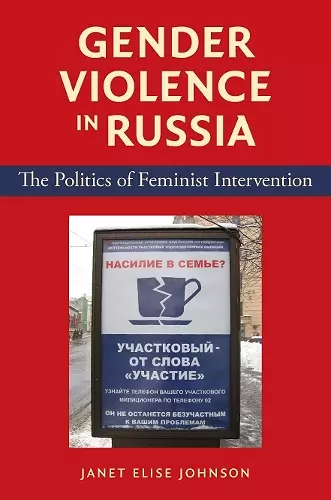Gender Violence in Russia
The Politics of Feminist Intervention
Format:Paperback
Publisher:Indiana University Press
Published:18th Feb '09
Currently unavailable, and unfortunately no date known when it will be back

Why some international interventions succeed while others fail
Just a few years ago, most Russian citizens did not recognize the notion of domestic violence or acknowledge that such a problem existed. Today, after years of local and international pressure to combat violence against women, things have changed dramatically. This title examines why and how this shift occurred.
Just a few years ago, most Russian citizens did not recognize the notion of domestic violence or acknowledge that such a problem existed. Today, after years of local and international pressure to combat violence against women, things have changed dramatically. Gender Violence in Russia examines why and how this shift occurred—and why there has been no similar reform on other gender violence issues such as rape, sexual assault, or human trafficking. Drawing on more than a decade of research, Janet Elise Johnson analyzes media coverage and survey data to explain why some interventions succeed while others fail. She describes the local-global dynamics between a range of international actors, from feminist activists to national governments, and an equally diverse set of Russian organizations and institutions.
Overall, this is an interesting account of a period of US-led development intervention in Russia and how it was, to a greater or lesser extent, shaped by the actions and goals of feminist activists. As such, it will be relevant to anyone concerned with the way that feminist concerns and development intervention interact, and with the recent development of feminism and civil society in Russia.March 2010
* Gender & Development *...well done and well structured. ...[P]rovides a well elaborated explanatory model of the effects of foreign intervention on the articulation of gender violence and the struggle against gender violence, and the limitations of this struggle, in Russia.Vol. 69. 2 Summer 2010
-- Anna Temkina * European Univ at St. Petersburg, Russia *[T]his is a very interesting, complex and well informed study, highly recommendable not only for scholars within the field of Russian studies, but for all who are interested in global feminism, development aid, and international relations.69.3, July 2010
* The Russian Review *Gender Violence in Russia provides an excellent account of the trials and tribulations of global feminism in Russia during this last, difficult decade. Vol. 6, No. 4, 2010
* Politics and Gender *In periods of rapid social change, the poets of one ideological system or another rush to find the cogent metaphor or, more recently, the winning soundbite, that will interpret the change to suit their own ends, to control meaning. To find and sell the right descriptive phrase is to raise the flag of possession over a historical event. For example, the collapse of the Soviet Union—or, even more stridently, the U.S. victory in the Cold War—spins the end of the 1980s, the end of history, as some proclaimed it, as a triumph of righteousness, rendered even more morally spectacular by the supposed 'coldness' of the conflict, and the ushering in of a new world order. That's why a book like Janet Johnson's 'Gender Violence in Russia' is so badly needed. The conclusion Johnson's study reaches is . . . that what really works, in terms of feminist intervention, are 'alliances between global feminists and large donors.' Money talks, apparently; or rather its use in creating organizations for women's advocacy is the best agent for social change. What Johnson calls 'flexible and responsive funding' is the key, targeting funds where they are most needed and can do the most good to protect women and to begin to change cultures of violence which have proven fearfully resistant to change.July 2, 2009
-- Rick Taylor * Feminist Review *All in all, this book provides us with a primary argument about the success and failure of international intervention for women's rights, but it can be read in many different ways: as a story about women's movements, as multiple stories about developing policy agendas on different forms of gender violence, as a story about weak state capacity in post-Soviet transition states, or as a story of transnational feminist networking. The wealth of data presented allows all of these readings. I highly recommend this book.
* Perspectives on PolitiISBN: 9780253220745
Dimensions: unknown
Weight: unknown
256 pages